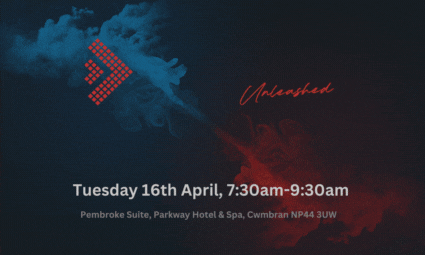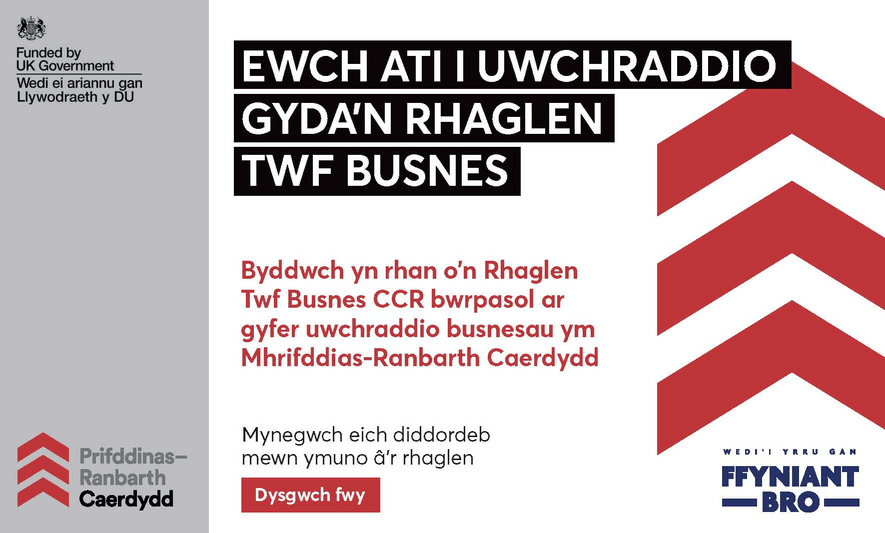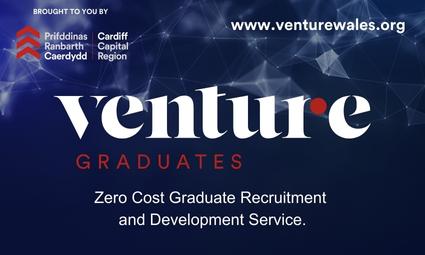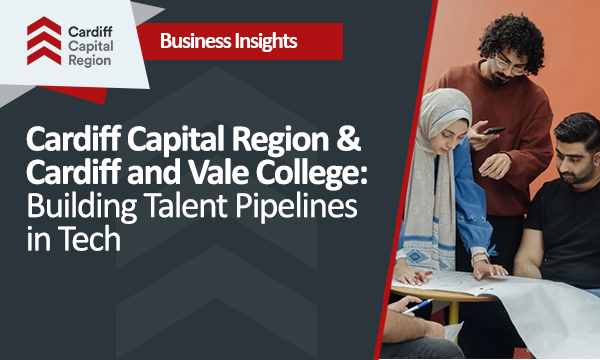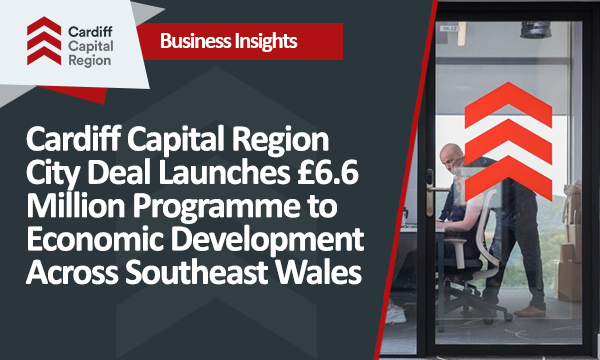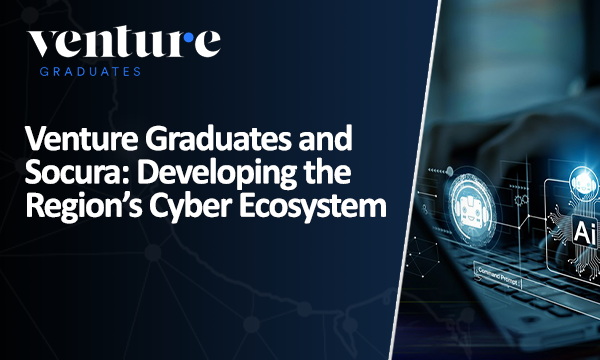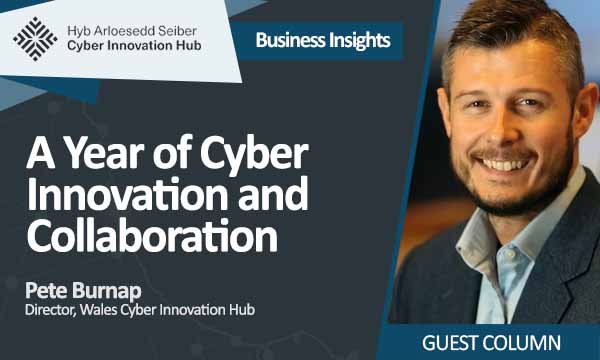As we come to the end of a truly turbulent year for Wales and the world, we review the progress made by Cardiff Capital Region (CCR) – one of the key drivers in creating prosperous communities and a resilient economy, across an area that produces 50% of the total economic output in Wales.
Kellie Beirne Director CCR City Deal and Frank Holmes, Chair of the Region’s Economic Growth Partnership, discuss both the questions asked and answers found to the many challenges and opportunities that emerged in a year that may have changed much of the world forever …
“We took the time to talk in-depth to businesses, government and communities”
“It may seem strange to say this, but it could well be that Cardiff Capital Region found its place on the curve in 2020” says Kellie.
“When Covid-19 impacted in late March and the country went into lockdown, we took stock rather than make any immediate knee-jerk reactions. We were in a comparatively privileged position of having a 20-year programme, so we took the time to talk to businesses, government, organisations such as FOR Cardiff and business communities right across South-East Wales – completing a comprehensive business survey that brought us in-depth information and wide-ranging insights.”
“We stayed alert to making interventions that matched our long-term strategy”
“That intelligence allowed us to do three things.
Firstly, we kicked the tyres on what we were doing, ensuring it was relevant for a world that seemed to be changing by the minute; identifying where we needed to shapeshift and adapt. That meant we were able to protect valuable programmes, such as our Graduate Scheme – and maintain the momentum behind our Homes for the Region project, which launched late August and is still open for applications. It was important we continued with the things we had already tried to make as sustainable and resilient as possible because we’ve always tried to keep an eye on solving problems rather than delivering the kind of schemes that look nice but have no application to real-world challenges.
Secondly – and crucially – we looked beyond survivability and we were fortunate in this respect to have a balanced Board with great experience and wide perspectives. Kevin Gardner, for example, as an Economist with Rothschilds, reminded us that the 2008 meltdown saw an unprecedented number of start-ups and new innovations so we kept an open mind and stayed alert to making new investments that would hit the mark for what we could reasonably foresee the economy being in the next couple of years – and make sure those interventions aligned with our mid-to-long-term strategy. Above all, we didn’t take our eyes off the need to rebuild resilience in the infrastructure for that long term.”
Thirdly, we produced our 10 Post-Covid Priorities. Published in June – perhaps the most immediate measure of what we feel has been a reasoned and circumspect reaction to the pandemic.
Six months on, what are some of the tangible results to date of this targeted approach?
“Catalysing a cluster whilst helping make Wales COVID resilient.”
“We’re committed to creating clusters in emerging industries where we believe we can go the distance – in areas such as Cyber, Creative, Compound Semiconductors and Medtech”, says Kellie.
The CCR has a burgeoning Medtech sector with many mature Medical Devices and Diagnostic companies, and with the right investment and focus on building ecosystems that harness the power of local supply, it has potential to develop into a world leading cluster.
“As an example of short-term interventions that are complementary to our long-term strategy and cognisant of the Covid impact, we acted quickly in the pandemic to make a £2 million repayable investment in Creo Medical, for cool plasma technology which had proven in control trials to kill airborne C19.We are also about to make a similar investment with a small local healthcare data intelligence business” says Kellie.
In essence, what the CCR is doing is catalysing local supply chains to help generate a Medtech cluster, whilst simultaneously helping in the fight to tackle COVID-19.”
“We need to be bold and continually hold up the mirror”
“Creo Medical’s a great example of how we can get behind those emerging businesses, identifying where there’s clearly a strong market and great potential – and supporting them fast” agrees Frank, “but we have to continue to be bold. There’s simply no room for complacency and there are other European environments in places such as Bilbao where equally impressive clusters are being built at a breath-taking pace. So we need to constantly hold up the mirror and the sensibility bar.”
Another great example of CCR thinking outside the box is the work currently underway to set up an “Innovation Fund” for SME’s. This proposed fund, will be used to provide growth capital to innovative businesses in key industry sectors such as compound semiconductors, med tech, cyber security and fintech, is aimed particularly at established innovative companies needing capital to scale up their operations.
“It’s hoped the Innovation Fund will deliver the sort of continuity investment that will bring key industry clusters to life, ensuring companies can fulfil their potential for innovation and producing economically significant hubs with multiplier effects into local and regional supply chains.” stresses Frank.
Kellie concurs. “It’s about co-ordinating, aligning and leveraging everything we do across the Region. And it’s also about being innovative ourselves.
“A challenge-driven approach working with services out there to come up with the answers.”
“Our Challenge Fund is an example of that. In 2019 we sat down and looked at introducing a Challenge-driven approach – and during COVID we’ve made that a reality.
“The first aspect of our Challenge Fund Programme worth £6m focuses on working with local authorities and public services to build their capacity through innovation and problem-solving – understanding that they are uniquely placed to convene around some of the big societal problems of the day. That saw us developing and becoming part of InFuSe (Innovative Future Services), partnering with Nesta (National Endowment for Science, Technology and the Arts) and Cardiff University.
“It’s almost like having an R&D facility in the public sector, involving more innovative processes and the widest range of ideas from the people who are closest to the day-to-day reality of it all.”
“A process of discovery and experimentation, fail fast and fail forward.”
There’s a declared intention to seamlessly deploy these new innovation tools, techniques and skills in conjunction with the new £10m CCR Challenge fund agreed in October – addressing gaps and markets where no current solution exists and, in so doing, driving innovation in public procurement to foster the growth of innovative SMEs across the foundational economy. The initial challenges are likely to revolve around 3 key themes – accelerating decarbonisation, improving wellbeing potentially through a focus on food security and supporting, enhancing high streets.”
We asked Kellie to explain why this approach is so innovative.
“Instead of putting tenders out there, we’ll be putting problems and data out there and asking Local Authorities, Public Services, third sector and private sector companies to collaborate and work with us to solve the problems.” explained Kellie.
“Thinking about how we solve challenges and overcome problems is a process of discovery and experimentation. We’re embarking on a different process; one of fail fast and fail forward.”
“Upskilling and Reskilling is critical – and on track”
Frank emphasises that a deep structural need to reskill and upskill the Region’s workforce underlies all the innovation. “That need has existed for well over a decade and it’s now more important than ever – indeed, it’s an absolute imperative if we’re going to have the skills to power our clusters and generally make our Region employee-base both competitive and resilient. The positive news is that under the great work done by Leigh Hughes at the Regional Skills Partnership, we are still on track to meet our three-year skills plan – and that means we can deliver the talent pipeline that’s needed for the post-COVID recovery.”
Making real the potential for businesses and communities across South East Wales has seen CCR lead, partner and pioneer ‘the new’ throughout the pandemic. Next week we’ll look at Kellie and Frank’s vision for the Region in 2021 and we’ll also be publishing a more in-depth feature on the achievements of 2020 later in December.




